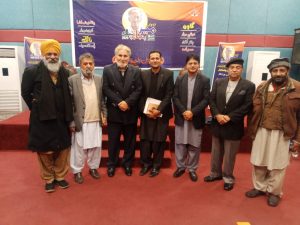LAHORE (Staff Report) – PILDAT has released its preliminary Comparative Scorecard which assesses Right to Information Legislation and its Implementation and promotion within Pakistan at the federal and provincial levels.
The assessment shows the Punjab Transparency and Right to Information Act 2013 and the Punjab Information Commission formed under this law have received the highest scores in comparison to counterpart RTI law and implementing and promotion agencies in place at the Federal level, and within KP, Sindh and Balochistan.
The KP RTI regime closely trails behind the Punjab RTI regime with 178 out of 400 points.
The Assessment Framework of the preliminary Comparative Scorecard was developed by PILDAT in‐house, based on consultations with key stakeholders responsible for the implementation and promotion of RTI legislation in Pakistan, including the Punjab Information Commission and the Khyber Pukhtunkhwa (KP) Right to Information Commission.
The Ministry of Information, Technology and Telecommunications, the agency responsible for computerization of official records at the Federal level, was the only implementing agency to score highly on the sub‐ parameter of Record Maintenance and Indexing, as it has already piloted and launched an E‐office system at the federal level, unlike its provincial counterparts.
RTI laws and their associated implementing and enforcement agencies at the federal level and within Sindh and Balochistan, could only be partially scored due to the unavailability of relevant data, and inapplicability of certain assessment criteria used in the scorecard.
Punjab RTI law scored highest out of all the laws assessed with 97 out of a total of 100 points as KP fails to frame RTI rules. The KP RTI law received lower (93 out of a total of 100) points because it has excluded Peshawar High Court from the scope and has failed to notify RTI rules.
Implementation of the law within government bodies of Punjab has been stronger than those in Khyber Pakhtunkhwa, as the former has been able to train more Information Officers and produce a Training Manual for them.
Both the KP RTI Commission and the Punjab Information Commission scored poorly in promotion of the law, because both have yet to publish their first Annual Reports or establish mechanisms to monitor implementation of RTI within Public Bodies although they are completing their two years since inception.
The KP RTI Commission scored higher than Punjab Information Commission on this parameter as it maintained a higher complaints disposal rate and has been able to launch more frequent and varied mass awareness campaigns.
The Punjab Information Commission scored higher than its KP counterpart in the overall scoring also because the latter has failed to release details of its Budget and Expenditures on its website.
The Assessment Framework measures and compares the state of RTI at the Federal and Provincial levels within the following areas: Strength of the Law; Implementation of the Law within Government Bodies; Promotion of the Law by Information Commission/Department; Infrastructure and Resources dedicated to Implementation and Promotion of the law
Scoring in these areas was conducted by PILDAT based upon publicly‐ available data relating to the implementation and promotion of RTI legislation within the Federation and 4 Provinces, including KP, Punjab, Sindh and Balochistan. A number of key findings emerged as a result of this scoring exercise.
The Federal RTI law has also been rated above its counterparts in Sindh and Balochistan because it applies to local government bodies, when read in conjunction with the Islamabad Local Government Act 2015.
The Government Public Bodies monitored by the Punjab Information Commission received a higher score than Government Public Bodies under the KP Right to Information Commission in terms of Implementation of the RTI law within Government Public Bodies, as they have been more effective in Appointment and Training of Information Officers.
Government Bodies under the ambit of RTI law at the Federal level and within Sindh and Balochistan could not be fully scored on the same Assessment Area, due to unavailability of data.













